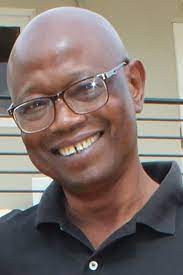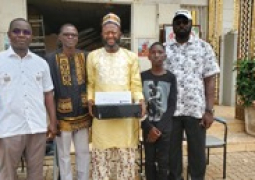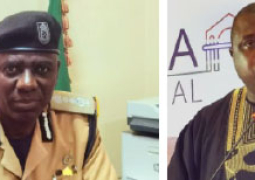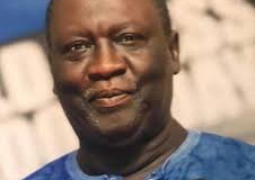
The new fellowship program was established thanks to a gift from the family of the late Roger D. Fisher ’43, LL.B. ’48, who served for decades as the Williston Professor of Law at Harvard Law School, co-founded the Harvard Negotiation Project, and co-authored the best-selling 1981 book, “Getting to Yes: Negotiating Agreement Without Giving In.”
“Roger Fisher’s pathbreaking work on negotiation contributed immensely to both the theory and practice of peacemaking in conflicts across the globe,” said John F. Manning ’85, the Helen and Morgan Chu Dean and Professor of Law. “As a leader and pioneer for justice and peace in The Gambia, Dr. Jallow will build on Professor Fisher’s important legacy. I know that our community will learn a great deal from the productive discussions and collaborations Dr. Jallow will foster on questions of negotiation and transitional justice.”
“Roger cared deeply about connecting theory and practice, and equipping leaders around the world with better tools and skills for managing our differences and charting paths for change,” said Sheila Heen, Thaddeus R. Beal Professor of Practice and Deputy Director of the Harvard Negotiation Project. Heen, who is a member of the Fisher Fellowship Selection Committee, added, “We have much to learn from Dr. Jallow’s courage in speaking up and helping illuminate a path for change in Gambia, and from his healing work on the Truth, Reconciliation, and Reparations Committee. We are delighted to be welcoming him to the community.”
Jallow was a leading voice in opposing the regime of Yahya Jammeh, the former military officer who overthrew The Gambia’s democratically elected president in 1994 and ruled that nation until 2017. Jammeh and his government have been accused of crimes ranging from financial corruption to human rights abuses.
Jallow was editor-in-chief of the newspaper, the Daily Observer, until it was bought by a Jammeh associate, after which Jallow founded and led a new outlet, The Independent. He was arrested and detained by the National Intelligence Agency several times for articles and editorials critical of the government. He subsequently fled into exile in 2000.
Settling in the United States, Jallow served as editor for AllAfrica.com, completed a master’s degree at Rutgers and a Ph.D. at University of California, Davis, and has published extensively on African history, leadership, politics, and social justice, teaching at both Creighton and LaSalle universities. Following Jammeh’s exile in 2017, he returned to his home country as a visiting professor at the University of The Gambia.
Beginning in 2018, Jallow served two years as executive secretary of the Truth, Reconciliation and Reparations Commission.
“I feel deeply humbled and honored to be named the inaugural Fisher Fellow and entrusted with the responsibility to continue Professor Fisher’s life’s work at Harvard,” said Jallow. “He was a great man and a brilliant scholar whose work on negotiation and conflict resolution is internationally acclaimed. I was particularly pleased to learn about Professor Fisher’s contribution to negotiating an end to apartheid in South Africa. I am grateful to Harvard Law School for considering me worthy of this honor and, God willing, will commence the one-year fellowship at Harvard in the summer of 2023.”
For the past three years, Jallow has been a guest in the Transitional Justice Seminar led by Lisa Dicker, lecturer on law and clinical instructor in the Harvard Negotiation & Mediation Clinical Program.
“I cannot express fully how in awe of Dr. Jallow I am and how powerful an advocate for justice and peacebuilding he is,” said Dicker. “Dr. Jallow has been truly incredible with my transitional justice students the last three years. … His emphasis is always on how the students should see themselves as agents of change in unjust systems and on the necessity of justice, in all its forms.”
The Fisher Fellowship honors the life and work of Roger D. Fisher, a longtime member of the Harvard Law community, by “supporting and encouraging new generations to improve, extend, teach, and apply the ideas, insights, and skills that help us reconcile conflict and agreement.” Jallow and future Fisher Fellows will work with faculty and students across the university to add to the cannon of ideas, insights, and skills of negotiation and conflict resolution, to advance the pedagogy of negotiation, and to articulate a pragmatic approach to the potential resolution of a persistent conflict of public significance.
As a professor at Harvard Law School, Fisher established negotiation and conflict resolution as a single field deserving academic study and devoted his career to challenging students and colleagues alike to explore alternative methods of dispute resolution. His best-selling book, “Getting to Yes: Negotiating Without Giving In,” which he co-authored with William Ury, had by the time of his death in 2012 been translated into 23 languages and has sold more than 3 million copies worldwide.
During World War II, Fisher served in the U.S. Army Air Force. After graduating from Harvard Law in 1948, he moved to Paris to work on the Marshall Plan under W. Averell Harriman. Fisher later served as an assistant to the U.S. solicitor general, arguing the landmark obscenity case, United States in Roth v. United States, before the U.S. Supreme Court in 1957.
Fisher joined the Harvard Law School faculty in 1958, became a full professor of law in 1960, and was appointed Samuel Williston Professor of Law in 1976. He also taught at the Harvard Kennedy School of Government, the London School of Economics, the Naval War College, Air War College, and the NATO Defense College.
Harvard Law School provides unparalleled opportunities to study law with extraordinary colleagues in a rigorous, vibrant, and collaborative environment.





